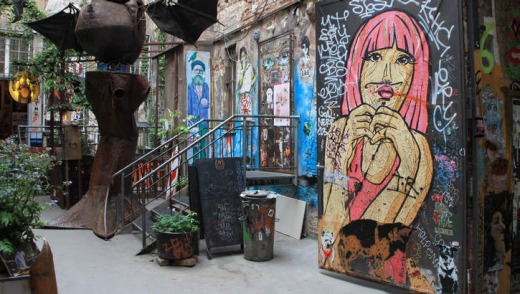You can see the graffiti scrawled high on the building wall. It's just a single word, "CATCH", that looks like it's been slapped on there with a paint roller by someone hanging from high on the roof. As an epithet it's a strange one. Catch? Catch what?
Mark, our tour guide, laughs. "There's a story behind that," he says. "Just like there's a story behind most of the graffiti you'll see around here. That was drawn by a local artist, a guy called Just. What he was trying to write up there was, 'Catch me if you can'. To kind of taunt the police who were after him. I guess it's a bit ironic - he was arrested before he could finish it."
You can see Just's work throughout the streets of Berlin, usually his name tagged on a building wall in Kreuzberg or Neukolln or Mitte. We've seen a few today as we've walked across the city, taking an alternative view of an already very alternative place. The tour began, incongruously, outside Starbucks.

That's not a very alternative spot to begin an alternative walking tour - the chain coffee store at Alexanderplatz must be about the most mainstream location in the city.
Still, it makes for an easy place to meet your guide, who today is standing around outside the shop smoking a hand-rolled cigarette, his leather boots, black jeans and dark jacket making him look like so many thousands of other people currently walking the streets of Berlin. Mark is slightly different, however. In a city that can sometimes guard its secrets zealously, he's here to give visitors an insider view of life away from the tourist trail, to avoid sights such as the Brandenburg Gate and Tiergarten in favour of abandoned warehouses and old train tracks and squats inhabited by Berlin's arty elite.
That's the allure of this tour: it's alternative. This is tourism designed for people who don't want to be tourists. It's a chance to see the "real" city, the one that doesn't make the brochures or the TripAdvisor top 10. It's also, unfortunately, very popular. I tried to do the Alternative Berlin tour almost a year ago, around Christmas, and failed. Turning up to Starbucks on a cold morning for the 11am departure, I found almost 200 young travellers milling around waiting for the tour to begin. When does alternative become the mainstream? When that many people are attempting to do a tour.
Today, however, only about 20 people have showed.
Mark, like many residents of Berlin, is not from Berlin. He's English, a theatre production specialist who was lured to the German capital by its promise of cheap living costs and a burgeoning art scene.
That art scene manifests itself in myriad ways, from the tags and pictures scrawled on building walls to the government-commissioned sculptures to Mark's own "opera for the people" project, a series of free shows in urban environments that takes opera to the masses. "You couldn't do what I do anywhere else," Mark tells me. "I mean, one of our performers runs through the crowd carrying a burning torch. It wouldn't be allowed anywhere else."
But Berlin is different. While most major cities offer some form of free walking tour, they're rarely like this. No tour guide with a microphone here; no queue of people following a flag. Each guide on the Alternative Berlin tours has their own unique route. Mark's doesn't include any opera, but it does include plenty of street art.
In Mitte we see work by a local called El Bocho, who has pasted up a series of pictures of "Little Lutzi", a fictitious girl based on an old Czech cartoon character, depicted killing her cat in various imaginative ways. Very strange, and very Berlin. In Friedrichshain there are huge murals of faces that Mark explains are photos of old residents of the city.
We hear about a guy who calls himself "Mr 6", who cycles around Berlin painting the number six on just about anything he can, from walls to posters to coffee cups in cafes. His theory, apparently, is that the more sixes he paints, the faster the internet speed will become. "Basically," Mark says, "he's crazy."
There are plenty more anecdotes. There's the ramshackle old house an immigrant built on a triangular strip of land in Kreuzberg that used to be right next to the Berlin Wall. A local priest stepped in to prevent its destruction and to this day not a single blot of graffiti marks his church - that's a big deal in Berlin. There's the story of a wave of gentrification sweeping the city.
And there's the story of Just, who dared police to catch him if they could. And they could.
Email: [email protected]
Instagram: instagram.com/bengroundwater